Passover, Omer, & Shavuot
Passover, Pesach פֶּסַח is a ritual meal, the Pesach seder, occurs the night of the paschal full moon after the 14th of Nisan, eve of the 15th, telling the story of the exodus, and remembering how the angel of death “passed over” the houses of the Israelites during the tenth plague on Egypt. It begins Feast of Unleavened Bread that continues through the 22nd of Nisan, and is one of three pilgrimage festivals in which all Jewish males living in the land of Israel are obliged. On the 16th of Nisan, Jews begin the counting of the Omer, the memorial offering of the first fruits of the barley harvest. The counting continues for seven weeks until the Feast of Shavuot, Weeks, This counting of days and weeks is understood to express anticipation and desire for the giving of the Torah. On Passover, the people of Israel were freed from their enslavement to Pharaoh; on Shavuot, they were given the Torah and became a nation committed to serving G-d. When the Temple in Jerusalem stood, the paschal lamb was offered and eaten on Passover eve, while the wave offering of barley was offered on the second day of the festival. Nowadays, in addition to the biblical prohibition of owning leavened foods for the duration of the holiday, the Passover seder is one of the most widely observed rituals in Judaism. In the Diaspora the unleavened bread is celebrated for 8 days.
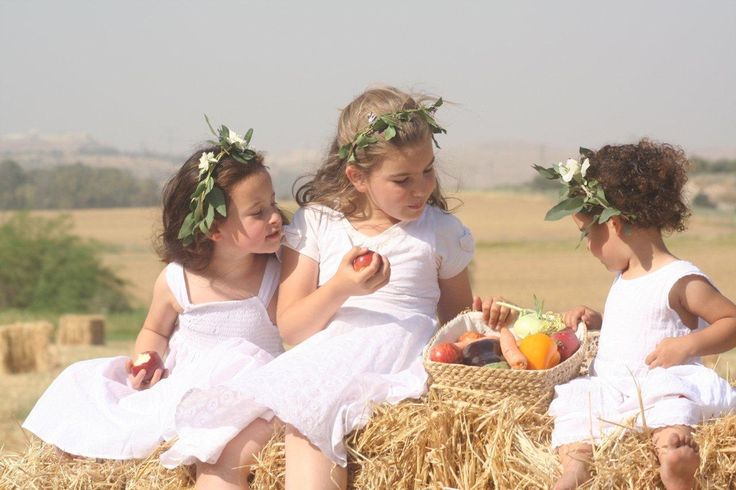
Chametz Matzah
The two main laws of Pesach are the laws of Chametz (bread that rises) and Matzah (flat bread). During Pesach we are forbidden to eat chametz. The Chasidut teaches us that Matzah is a symbol of Yetzer Tov; like a person who is always humble in the presence of Hashem. On the other hand, Chametz is a symbol of Yetzer Ra, a person who “rises” in arrogance and very proud of him/her self. The difference between arrogance and humility can be very slight, even a little bit of arrogance is not good; like wise, even a small crumb of chametz is forbidden on Pesach.
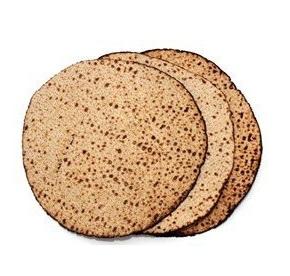
Shir Hashirim
The Song of Songs is read on the morning of the Seventh Day of Passover. The Song of Songs talks of the love between husband and wife-an analogy for the passionate love between G‑d, the supernal groom, and His beloved bride Israel. According to the RAMBAM, the highest form of relationship between a human being and G-d is the relationship based on love, “Ahavat HaShem,” even higher than the relationship built on fear or reverence, “Yirat HaShem.” The RAMBAM continues, “Just as when a man loves a particular woman, he cannot remove her from his thoughts, with just such intensity should a person love HaShem.
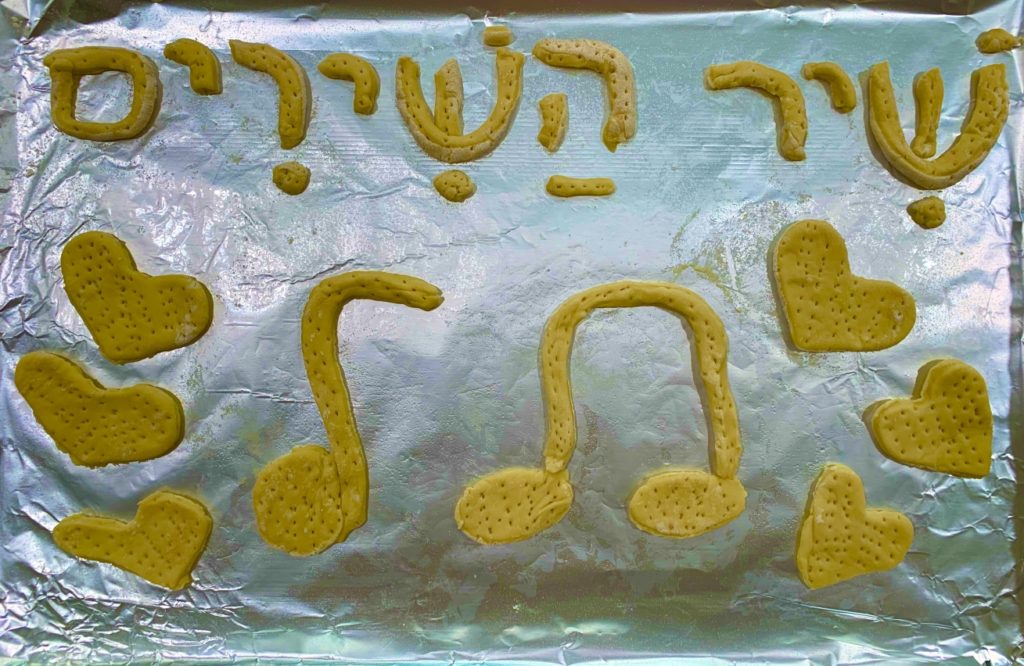
The Seventh Day of Passover
The Seventh and last Day of Passover is called “Shevi’i shel Pesach”.
It is a yom tov, and as such, all the laws of yom tov apply; “eesur melacha” (prohibited activities) other than those relating directly to food preparation. On the Seventh Day of Passover we commemorate the Parting of the Red Sea by reading how on this day the sea split for the Children of Israel and drowned the pursuing Egyptians, and the “Song at the Sea” sung by the people upon their deliverance (Exodus 13:17-15:26). We also recite a partial Hallel.
Shviee Shel Pesach Readings
The song of Moses (Exodus 15) in the Torah reading and the song of Thanksgiving by David (Samuel II 22:1-51) in the haftarah reading are both dramatic accounts of the hidden power and protective care and guidance of G-d over the Jewish nation. Shviee Shel Pesach: Exodus 13:17 – 15:26-Torah / Moses Shirat Hayam
Shviee Shel Pesach: Numbers 28:19-25-Maftir
Shviee Shel Pesach: Samuel II 22:1-51-Haftarah / David song of Thanksgiving
Shviee Shel Pesach: Exodus 13:17 – 15:26
In the middle of the night (Nissan 15th) G-d struck the Egyptians with “the plague of the firstborn”, killing Egyptians’ firstborn, leading Egyptian king, Pharaoh, to tell the Israelites – “Get up and get out from among my people!” On 15 Nissan the Children of Israel left Egypt, it took them six days to reach the shores of The Red Sea (1313 BCE)
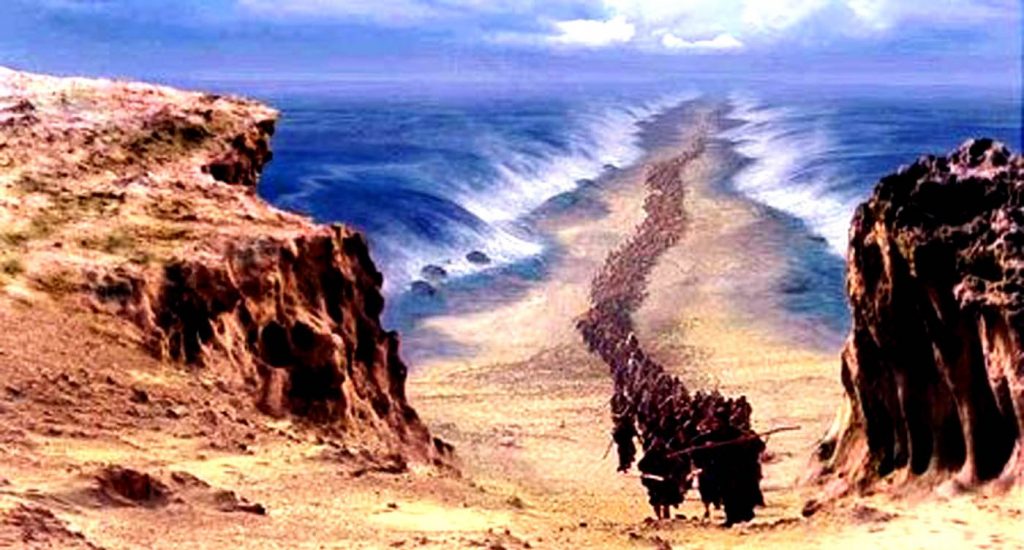
Shirat Hayam
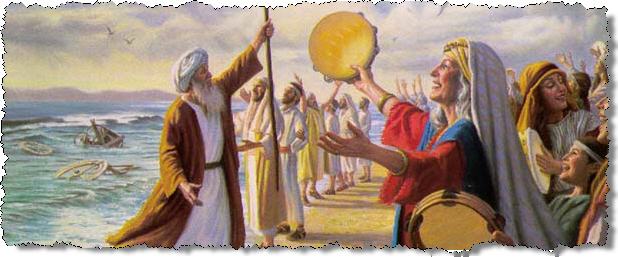
Shirat HaYam is read in the service at the end of the pesukei d’zimra, during the torah reading Beshallach, as the reading for seventh day Pesach, and was also recited by the Levites to accompany the tamid sacrifice at mincha on shabbat (see Talmud Rh31a)
We recite Shirat Hayam on the seventh day of Pesach based on the tradition that the miracle of the waters occurred on that day. On the eve of the seventh day after the Exodus, the Children of Israel were trapped between the Egyptian army pursuing them, as the Egyptian king had a change of heart, and the waters of the Red Sea before them. G-d commanded Moses: “Speak to the Children of Israel, that they should move forward!” it seems that the Children of Israel were commanded to walk into the sea even before it split. Nachshon ben Aminadav of the tribe of Judah was the first to jump into the sea (Midrash and Talmud); the water split, and “the children of Israel walked across on the dry land in the midst of the sea.” All that night, a pillar of fire intervened between the Egyptians and the Israelites. When the Egyptians followed, the waters returned to their natural state and place and drowned them. The Children of Israel sang the “Song at the Sea” in praise and gratitude to G-d.
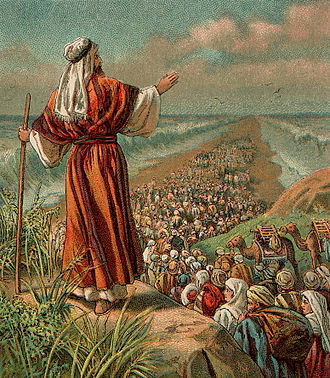
The Song of the Sea-שירת הים-Shirat HaYam-Az Yashir Moshe-Song of Moses-Mi Chamocha, is a poem that appears in the Book of Exodus 15:1–18. The Song of the Sea was sung by the Israelites after their crossing the Red Sea in safety, and celebrates the destruction of the Egyptian army during the crossing, and looks forward to the future conquest of Canaan.
שמות ט״ו:א׳-כ״ז(א) אָ֣ז יָשִֽׁיר־מֹשֶׁה֩ וּבְנֵ֨י יִשְׂרָאֵ֜ל אֶת־הַשִּׁירָ֤ה הַזֹּאת֙ לַֽיהוָ֔ה וַיֹּאמְר֖וּ לֵאמֹ֑ר אָשִׁ֤ירָה לַֽיהוָה֙ כִּֽי־גָאֹ֣ה גָּאָ֔ה ס֥וּס וְרֹכְב֖וֹ רָמָ֥ה בַיָּֽם׃ (ב) עָזִּ֤י וְזִמְרָת֙ יָ֔הּ וַֽיְהִי־לִ֖י לִֽישׁוּעָ֑ה זֶ֤ה אֵלִי֙ וְאַנְוֵ֔הוּ אֱלֹהֵ֥י אָבִ֖י וַאֲרֹמְמֶֽנְהוּ׃ (ג) יְהוָ֖ה אִ֣ישׁ מִלְחָמָ֑ה יְהוָ֖ה שְׁמֽוֹ׃ (ד) מַרְכְּבֹ֥ת פַּרְעֹ֛ה וְחֵיל֖וֹ יָרָ֣ה בַיָּ֑ם וּמִבְחַ֥ר שָֽׁלִשָׁ֖יו טֻבְּע֥וּ בְיַם־סֽוּף׃ (ה) תְּהֹמֹ֖ת יְכַסְיֻ֑מוּ יָרְד֥וּ בִמְצוֹלֹ֖ת כְּמוֹ־אָֽבֶן׃ (ו) יְמִֽינְךָ֣ יְהוָ֔ה נֶאְדָּרִ֖י בַּכֹּ֑חַ יְמִֽינְךָ֥ יְהוָ֖ה תִּרְעַ֥ץ אוֹיֵֽב׃ (ז) וּבְרֹ֥ב גְּאוֹנְךָ֖ תַּהֲרֹ֣ס קָמֶ֑יךָ תְּשַׁלַּח֙ חֲרֹ֣נְךָ֔ יֹאכְלֵ֖מוֹ כַּקַּֽשׁ׃ (ח) וּבְר֤וּחַ אַפֶּ֙יךָ֙ נֶ֣עֶרְמוּ מַ֔יִם נִצְּב֥וּ כְמוֹ־נֵ֖ד נֹזְלִ֑ים קָֽפְא֥וּ תְהֹמֹ֖ת בְּלֶב־יָֽם׃ (ט) אָמַ֥ר אוֹיֵ֛ב אֶרְדֹּ֥ף אַשִּׂ֖יג אֲחַלֵּ֣ק שָׁלָ֑ל תִּמְלָאֵ֣מוֹ נַפְשִׁ֔י אָרִ֣יק חַרְבִּ֔י תּוֹרִישֵׁ֖מוֹ יָדִֽי׃ (י) נָשַׁ֥פְתָּ בְרוּחֲךָ֖ כִּסָּ֣מוֹ יָ֑ם צָֽלֲלוּ֙ כַּֽעוֹפֶ֔רֶת בְּמַ֖יִם אַדִּירִֽים׃ (יא) מִֽי־כָמֹ֤כָה בָּֽאֵלִם֙ יְהוָ֔ה מִ֥י כָּמֹ֖כָה נֶאְדָּ֣ר בַּקֹּ֑דֶשׁ נוֹרָ֥א תְהִלֹּ֖ת עֹ֥שֵׂה פֶֽלֶא׃ (יב) נָטִ֙יתָ֙ יְמִ֣ינְךָ֔ תִּבְלָעֵ֖מוֹ אָֽרֶץ׃ (יג) נָחִ֥יתָ בְחַסְדְּךָ֖ עַם־ז֣וּ גָּאָ֑לְתָּ נֵהַ֥לְתָּ בְעָזְּךָ֖ אֶל־נְוֵ֥ה קָדְשֶֽׁךָ׃ (יד) שָֽׁמְע֥וּ עַמִּ֖ים יִרְגָּז֑וּן חִ֣יל אָחַ֔ז יֹשְׁבֵ֖י פְּלָֽשֶׁת׃ (טו) אָ֤ז נִבְהֲלוּ֙ אַלּוּפֵ֣י אֱד֔וֹם אֵילֵ֣י מוֹאָ֔ב יֹֽאחֲזֵ֖מוֹ רָ֑עַד נָמֹ֕גוּ כֹּ֖ל יֹשְׁבֵ֥י כְנָֽעַן׃ (טז) תִּפֹּ֨ל עֲלֵיהֶ֤ם אֵימָ֙תָה֙ וָפַ֔חַד בִּגְדֹ֥ל זְרוֹעֲךָ֖ יִדְּמ֣וּ כָּאָ֑בֶן עַד־יַעֲבֹ֤ר עַמְּךָ֙ יְהוָ֔ה עַֽד־יַעֲבֹ֖ר עַם־ז֥וּ קָנִֽיתָ׃ (יז) תְּבִאֵ֗מוֹ וְתִטָּעֵ֙מוֹ֙ בְּהַ֣ר נַחֲלָֽתְךָ֔ מָכ֧וֹן לְשִׁבְתְּךָ֛ פָּעַ֖לְתָּ יְהוָ֑ה מִקְּדָ֕שׁ אֲדֹנָ֖י כּוֹנְנ֥וּ יָדֶֽיךָ׃ (יח) יְהוָ֥ה ׀ יִמְלֹ֖ךְ לְעֹלָ֥ם וָעֶֽד׃ (יט) כִּ֣י בָא֩ ס֨וּס פַּרְעֹ֜ה בְּרִכְבּ֤וֹ וּבְפָרָשָׁיו֙ בַּיָּ֔ם וַיָּ֧שֶׁב יְהוָ֛ה עֲלֵהֶ֖ם אֶת־מֵ֣י הַיָּ֑ם וּבְנֵ֧י יִשְׂרָאֵ֛ל הָלְכ֥וּ בַיַּבָּשָׁ֖ה בְּת֥וֹךְ הַיָּֽם׃ (פ) (כ) וַתִּקַּח֩ מִרְיָ֨ם הַנְּבִיאָ֜ה אֲח֧וֹת אַהֲרֹ֛ן אֶת־הַתֹּ֖ף בְּיָדָ֑הּ וַתֵּצֶ֤אןָ כָֽל־הַנָּשִׁים֙ אַחֲרֶ֔יהָ בְּתֻפִּ֖ים וּבִמְחֹלֹֽת׃ (כא) וַתַּ֥עַן לָהֶ֖ם מִרְיָ֑ם שִׁ֤ירוּ לַֽיהוָה֙ כִּֽי־גָאֹ֣ה גָּאָ֔ה ס֥וּס וְרֹכְב֖וֹ רָמָ֥ה בַיָּֽם׃ (ס) (כב) וַיַּסַּ֨ע מֹשֶׁ֤ה אֶת־יִשְׂרָאֵל֙ מִיַּם־ס֔וּף וַיֵּצְא֖וּ אֶל־מִדְבַּר־שׁ֑וּר וַיֵּלְכ֧וּ שְׁלֹֽשֶׁת־יָמִ֛ים בַּמִּדְבָּ֖ר וְלֹא־מָ֥צְאוּ מָֽיִם׃ (כג) וַיָּבֹ֣אוּ מָרָ֔תָה וְלֹ֣א יָֽכְל֗וּ לִשְׁתֹּ֥ת מַ֙יִם֙ מִמָּרָ֔ה כִּ֥י מָרִ֖ים הֵ֑ם עַל־כֵּ֥ן קָרָֽא־שְׁמָ֖הּ מָרָֽה׃ (כד) וַיִּלֹּ֧נוּ הָעָ֛ם עַל־מֹשֶׁ֥ה לֵּאמֹ֖ר מַה־נִּשְׁתֶּֽה׃ (כה) וַיִּצְעַ֣ק אֶל־יְהוָ֗ה וַיּוֹרֵ֤הוּ יְהוָה֙ עֵ֔ץ וַיַּשְׁלֵךְ֙ אֶל־הַמַּ֔יִם וַֽיִּמְתְּק֖וּ הַמָּ֑יִם שָׁ֣ם שָׂ֥ם ל֛וֹ חֹ֥ק וּמִשְׁפָּ֖ט וְשָׁ֥ם נִסָּֽהוּ׃ (כו) וַיֹּאמֶר֩ אִם־שָׁמ֨וֹעַ תִּשְׁמַ֜ע לְק֣וֹל ׀ יְהוָ֣ה אֱלֹהֶ֗יךָ וְהַיָּשָׁ֤ר בְּעֵינָיו֙ תַּעֲשֶׂ֔ה וְהַֽאֲזַנְתָּ֙ לְמִצְוֺתָ֔יו וְשָׁמַרְתָּ֖ כָּל־חֻקָּ֑יו כָּֽל־הַמַּֽחֲלָ֞ה אֲשֶׁר־שַׂ֤מְתִּי בְמִצְרַ֙יִם֙ לֹא־אָשִׂ֣ים עָלֶ֔יךָ כִּ֛י אֲנִ֥י יְהוָ֖ה רֹפְאֶֽךָ׃ (ס) (כז) וַיָּבֹ֣אוּ אֵילִ֔מָה וְשָׁ֗ם שְׁתֵּ֥ים עֶשְׂרֵ֛ה עֵינֹ֥ת מַ֖יִם וְשִׁבְעִ֣ים תְּמָרִ֑ים וַיַּחֲנוּ־שָׁ֖ם עַל־הַמָּֽיִם׃

Exodus 15:1-27(1) Then Moses and the Israelites sang this song to the LORD. They said: I will sing to the LORD, for He has triumphed gloriously; Horse and driver He has hurled into the sea. (2) The LORD is my strength and might; He is become my deliverance. This is my God and I will enshrine Him; The God of my father, and I will exalt Him. (3) The LORD, the Warrior— LORD is His name! (4) Pharaoh’s chariots and his army He has cast into the sea; And the pick of his officers Are drowned in the Sea of Reeds. (5) The deeps covered them; They went down into the depths like a stone. (6) Your right hand, O LORD, glorious in power, Your right hand, O LORD, shatters the foe! (7) In Your great triumph You break Your opponents; You send forth Your fury, it consumes them like straw. (8) At the blast of Your nostrils the waters piled up, The floods stood straight like a wall; The deeps froze in the heart of the sea. (9) The foe said, “I will pursue, I will overtake, I will divide the spoil; My desire shall have its fill of them. I will bare my sword— My hand shall subdue them.” (10) You made Your wind blow, the sea covered them; They sank like lead in the majestic waters. (11) Who is like You, O LORD, among the celestials; Who is like You, majestic in holiness, Awesome in splendor, working wonders! (12) You put out Your right hand, The earth swallowed them. (13) In Your love You lead the people You redeemed; In Your strength You guide them to Your holy abode. (14) The peoples hear, they tremble; Agony grips the dwellers in Philistia. (15) Now are the clans of Edom dismayed; The tribes of Moab—trembling grips them; All the dwellers in Canaan are aghast. (16) Terror and dread descend upon them; Through the might of Your arm they are still as stone— Till Your people cross over, O LORD, Till Your people cross whom You have ransomed. (17) You will bring them and plant them in Your own mountain, The place You made to dwell in, O LORD, The sanctuary, O LORD, which Your hands established. (18) The LORD will reign for ever and ever! (19) For the horses of Pharaoh, with his chariots and horsemen, went into the sea; and the LORD turned back on them the waters of the sea; but the Israelites marched on dry ground in the midst of the sea. (20) Then Miriam the prophetess, Aaron’s sister, took a timbrel in her hand, and all the women went out after her in dance with timbrels. (21) And Miriam chanted for them: Sing to the LORD, for He has triumphed gloriously; Horse and driver He has hurled into the sea. (22) Then Moses caused Israel to set out from the Sea of Reeds. They went on into the wilderness of Shur; they traveled three days in the wilderness and found no water. (23) They came to Marah, but they could not drink the water of Marah because it was bitter; that is why it was named Marah. (24) And the people grumbled against Moses, saying, “What shall we drink?” (25) So he cried out to the LORD, and the LORD showed him a piece of wood; he threw it into the water and the water became sweet. There He made for them a fixed rule, and there He put them to the test. (26) He said, “If you will heed the LORD your God diligently, doing what is upright in His sight, giving ear to His commandments and keeping all His laws, then I will not bring upon you any of the diseases that I brought upon the Egyptians, for I the LORD am your healer.” (27) And they came to Elim, where there were twelve springs of water and seventy palm trees; and they encamped there beside the water.
Shviee Shel Pesach: Numbers 28:19-25-Maftir
וְהִקְרַבְתֶּ֨ם אִשֶּׁ֤ה עֹלָה֙ לַֽיהוָ֔ה פָּרִ֧ים בְּנֵי־בָקָ֛ר שְׁנַ֖יִם וְאַ֣יִל אֶחָ֑ד וְשִׁבְעָ֤ה כְבָשִׂים֙ בְּנֵ֣י שָׁנָ֔ה תְּמִימִ֖ם יִהְי֥וּ לָכֶֽם׃You shall present an offering by fire, a burnt offering, to the LORD: two bulls of the herd, one ram, and seven yearling lambs—see that they are without blemish.
וּמִ֨נְחָתָ֔ם סֹ֖לֶת בְּלוּלָ֣ה בַשָּׁ֑מֶן שְׁלֹשָׁ֨ה עֶשְׂרֹנִ֜ים לַפָּ֗ר וּשְׁנֵ֧י עֶשְׂרֹנִ֛ים לָאַ֖יִל תַּעֲשֽׂוּ׃
The meal offering with them shall be of choice flour with oil mixed in: prepare three-tenths of a measure for a bull, two-tenths for a ram;
עִשָּׂר֤וֹן עִשָּׂרוֹן֙ תַּעֲשֶׂ֔ה לַכֶּ֖בֶשׂ הָאֶחָ֑ד לְשִׁבְעַ֖ת הַכְּבָשִֽׂים׃and for each of the seven lambs prepare one-tenth of a measure.
וּשְׂעִ֥יר חַטָּ֖את אֶחָ֑ד לְכַפֵּ֖ר עֲלֵיכֶֽם׃And there shall be one goat for a sin offering, to make expiation in your behalf.
מִלְּבַד֙ עֹלַ֣ת הַבֹּ֔קֶר אֲשֶׁ֖ר לְעֹלַ֣ת הַתָּמִ֑יד תַּעֲשׂ֖וּ אֶת־אֵֽלֶּה׃You shall present these in addition to the morning portion of the regular burnt offering.
כָּאֵ֜לֶּה תַּעֲשׂ֤וּ לַיּוֹם֙ שִׁבְעַ֣ת יָמִ֔ים לֶ֛חֶם אִשֵּׁ֥ה רֵֽיחַ־נִיחֹ֖חַ לַיהוָ֑ה עַל־עוֹלַ֧ת הַתָּמִ֛יד יֵעָשֶׂ֖ה וְנִסְכּֽוֹ׃
You shall offer the like daily for seven days as food, an offering by fire of pleasing odor to the LORD; they shall be offered, with their libations, in addition to the regular burnt offering.
וּבַיּוֹם֙ הַשְּׁבִיעִ֔י מִקְרָא־קֹ֖דֶשׁ יִהְיֶ֣ה לָכֶ֑ם כָּל־מְלֶ֥אכֶת עֲבֹדָ֖ה לֹ֥א תַעֲשֽׂוּ׃ ס
And the seventh day shall be a sacred occasion for you: you shall not work at your occupations.
Shviee Shel Pesach: Samuel II 22:1-51-haftarah
This Haftarah is David’s great hymn of victory and thanksgiving, sung to G-d “after the LORD had saved him from the hands of all his enemies and from the hands of Saul.” 1וַיְדַבֵּ֤ר דָּוִד֙ לַֽיהוָ֔ה אֶת־דִּבְרֵ֖י הַשִּׁירָ֣ה הַזֹּ֑את בְּיוֹם֩ הִצִּ֨יל יְהוָ֥ה אֹת֛וֹ מִכַּ֥ף כָּל־אֹיְבָ֖יו וּמִכַּ֥ף שָׁאֽוּל׃
David addressed the words of this song to the LORD, after the LORD had saved him from the hands of all his enemies and from the hands of Saul.
2וַיֹּאמַ֑ר יְהוָ֛ה סַֽלְעִ֥י וּמְצֻדָתִ֖י וּמְפַלְטִי־לִֽי׃He said: O LORD, my crag, my fastness, my deliverer!
3אֱלֹהֵ֥י צוּרִ֖י אֶחֱסֶה־בּ֑וֹ מָגִנִּ֞י וְקֶ֣רֶן יִשְׁעִ֗י מִשְׂגַּבִּי֙ וּמְנוּסִ֔י מֹשִׁעִ֕י מֵחָמָ֖ס תֹּשִׁעֵֽנִי׃O God, the rock wherein I take shelter: My shield, my mighty champion, my fortress and refuge! My savior, You who rescue me from violence! 4מְהֻלָּ֖ל אֶקְרָ֣א יְהוָ֑ה וּמֵאֹיְבַ֖י אִוָּשֵֽׁעַ׃All praise! I called on the LORD, And I was delivered from my enemies.
5כִּ֥י אֲפָפֻ֖נִי מִשְׁבְּרֵי־מָ֑וֶת נַחֲלֵ֥י בְלִיַּ֖עַל יְבַעֲתֻֽנִי׃For the breakers of Death encompassed me, The torrents of Belial terrified me;
6חֶבְלֵ֥י שְׁא֖וֹל סַבֻּ֑נִי קִדְּמֻ֖נִי מֹֽקְשֵׁי־מָֽוֶת׃The snares of Sheol encircled me, The coils of Death engulfed me.
7בַּצַּר־לִי֙ אֶקְרָ֣א יְהוָ֔ה וְאֶל־אֱלֹהַ֖י אֶקְרָ֑א וַיִּשְׁמַ֤ע מֵהֵֽיכָלוֹ֙ קוֹלִ֔י וְשַׁוְעָתִ֖י בְּאָזְנָֽיו׃In my anguish I called on the LORD, Cried out to my God; In His Abode He heard my voice, My cry entered His ears.
8ותגעש [וַיִּתְגָּעַ֤שׁ] וַתִּרְעַשׁ֙ הָאָ֔רֶץ מוֹסְד֥וֹת הַשָּׁמַ֖יִם יִרְגָּ֑זוּ וַיִּֽתְגָּעֲשׁ֖וּ כִּֽי־חָ֥רָה לֽוֹ׃Then the earth rocked and quaked, The foundations of heaven shook— Rocked by His indignation.
9עָלָ֤ה עָשָׁן֙ בְּאַפּ֔וֹ וְאֵ֥שׁ מִפִּ֖יו תֹּאכֵ֑ל גֶּחָלִ֖ים בָּעֲר֥וּ מִמֶּֽנּוּ׃Smoke went up from His nostrils, From His mouth came devouring fire; Live coals blazed forth from Him.
10וַיֵּ֥ט שָׁמַ֖יִם וַיֵּרַ֑ד וַעֲרָפֶ֖ל תַּ֥חַת רַגְלָֽיו׃He bent the sky and came down, Thick cloud beneath His feet.
11וַיִּרְכַּ֥ב עַל־כְּר֖וּב וַיָּעֹ֑ף וַיֵּרָ֖א עַל־כַּנְפֵי־רֽוּחַ׃He mounted a cherub and flew; He was seen on the wings of the wind.
12וַיָּ֥שֶׁת חֹ֛שֶׁךְ סְבִיבֹתָ֖יו סֻכּ֑וֹת חַֽשְׁרַת־מַ֖יִם עָבֵ֥י שְׁחָקִֽים׃He made pavilions of darkness about Him, Dripping clouds, huge thunderheads;
13מִנֹּ֖גַהּ נֶגְדּ֑וֹ בָּעֲר֖וּ גַּחֲלֵי־אֵֽשׁ׃In the brilliance before Him Blazed fiery coals.
14יַרְעֵ֥ם מִן־שָׁמַ֖יִם יְהוָ֑ה וְעֶלְי֖וֹן יִתֵּ֥ן קוֹלֽוֹ׃The LORD thundered forth from heaven, The Most High sent forth His voice;
15וַיִּשְׁלַ֥ח חִצִּ֖ים וַיְפִיצֵ֑ם בָּרָ֖ק ויהמם [וַיָּהֹֽם׃]He let loose bolts, and scattered them; Lightning, and put them to rout.
16וַיֵּֽרָאוּ֙ אֲפִ֣קֵי יָ֔ם יִגָּל֖וּ מֹסְד֣וֹת תֵּבֵ֑ל בְּגַעֲרַ֣ת יְהוָ֔ה מִנִּשְׁמַ֖ת ר֥וּחַ אַפּֽוֹ׃The bed of the sea was exposed, The foundations of the world were laid bare By the mighty roaring of the LORD, At the blast of the breath of His nostrils.
17יִשְׁלַ֥ח מִמָּר֖וֹם יִקָּחֵ֑נִי יַֽמְשֵׁ֖נִי מִמַּ֥יִם רַבִּֽים׃He reached down from on high, He took me, Drew me out of the mighty waters;
18יַצִּילֵ֕נִי מֵאֹיְבִ֖י עָ֑ז מִשֹּׂ֣נְאַ֔י כִּ֥י אָמְצ֖וּ מִמֶּֽנִּי׃He rescued me from my enemy so strong, From foes too mighty for me.
19יְקַדְּמֻ֖נִי בְּי֣וֹם אֵידִ֑י וַיְהִ֧י יְהוָ֛ה מִשְׁעָ֖ן לִֽי׃They attacked me on my day of calamity, But the LORD was my stay.
20וַיֹּצֵ֥א לַמֶּרְחָ֖ב אֹתִ֑י יְחַלְּצֵ֖נִי כִּי־חָ֥פֵֽץ בִּֽי׃He brought me out to freedom, He rescued me because He was pleased with me.
21יִגְמְלֵ֥נִי יְהוָ֖ה כְּצִדְקָתִ֑י כְּבֹ֥ר יָדַ֖י יָשִׁ֥יב לִֽי׃The LORD rewarded me according to my merit, He requited the cleanness of my hands.
22כִּ֥י שָׁמַ֖רְתִּי דַּרְכֵ֣י יְהוָ֑ה וְלֹ֥א רָשַׁ֖עְתִּי מֵאֱלֹהָֽי׃For I have kept the ways of the LORD And have not been guilty before my God;
23כִּ֥י כָל־משפטו [מִשְׁפָּטָ֖יו] לְנֶגְדִּ֑י וְחֻקֹּתָ֖יו לֹא־אָס֥וּר מִמֶּֽנָּה׃I am mindful of all His rules And have not departed from His laws.
24וָאֶהְיֶ֥ה תָמִ֖ים ל֑וֹ וָאֶשְׁתַּמְּרָ֖ה מֵעֲוֺנִֽי׃I have been blameless before Him, And have guarded myself against sinning—
25וַיָּ֧שֶׁב יְהוָ֛ה לִ֖י כְּצִדְקָתִ֑י כְּבֹרִ֖י לְנֶ֥גֶד עֵינָֽיו׃And the LORD has requited my merit, According to my purity in His sight.
26עִם־חָסִ֖יד תִּתְחַסָּ֑ד עִם־גִּבּ֥וֹר תָּמִ֖ים תִּתַּמָּֽם׃With the loyal You deal loyally; With the blameless hero, blamelessly.
27עִם־נָבָ֖ר תִּתָּבָ֑ר וְעִם־עִקֵּ֖שׁ תִּתַּפָּֽל׃With the pure You act in purity, And with the perverse You are wily.
28וְאֶת־עַ֥ם עָנִ֖י תּוֹשִׁ֑יעַ וְעֵינֶ֖יךָ עַל־רָמִ֥ים תַּשְׁפִּֽיל׃To humble folk You give victory, And You look with scorn on the haughty.
29כִּֽי־אַתָּ֥ה נֵירִ֖י יְהוָ֑ה וַיהוָ֖ה יַגִּ֥יהַּ חָשְׁכִּֽי׃You, O LORD, are my lamp; The LORD lights up my darkness.
30כִּ֥י בְכָ֖ה אָר֣וּץ גְּד֑וּד בֵּאלֹהַ֖י אֲדַלֶּג־שֽׁוּר׃With You, I can rush a barrier, With my God, I can scale a wall.
31הָאֵ֖ל תָּמִ֣ים דַּרְכּ֑וֹ אִמְרַ֤ת יְהוָה֙ צְרוּפָ֔ה מָגֵ֣ן ה֔וּא לְכֹ֖ל הַחֹסִ֥ים בּֽוֹ׃The way of God is perfect, The word of the LORD is pure. He is a shield to all who take refuge in Him.
32כִּ֥י מִי־אֵ֖ל מִבַּלְעֲדֵ֣י יְהוָ֑ה וּמִ֥י צ֖וּר מִֽבַּלְעֲדֵ֥י אֱלֹהֵֽינוּ׃Yea, who is a god except the LORD, Who is a rock except God—
33הָאֵ֥ל מָעוּזִּ֖י חָ֑יִל וַיַּתֵּ֥ר תָּמִ֖ים דרכו [דַּרְכִּֽי׃]The God, my mighty stronghold, Who kept my path secure;
34מְשַׁוֶּ֥ה רגליו [רַגְלַ֖י] כָּאַיָּל֑וֹת וְעַ֥ל בָּמוֹתַ֖י יַעֲמִדֵֽנִי׃Who made my legs like a deer’s, And set me firm on the heights;
35מְלַמֵּ֥ד יָדַ֖י לַמִּלְחָמָ֑ה וְנִחַ֥ת קֶֽשֶׁת־נְחוּשָׁ֖ה זְרֹעֹתָֽי׃Who trained my hands for battle, So that my arms can bend a bow of bronze!
36וַתִּתֶּן־לִ֖י מָגֵ֣ן יִשְׁעֶ֑ךָ וַעֲנֹתְךָ֖ תַּרְבֵּֽנִי׃You have granted me the shield of Your protection And Your providence has made me great.
37תַּרְחִ֥יב צַעֲדִ֖י תַּחְתֵּ֑נִי וְלֹ֥א מָעֲד֖וּ קַרְסֻלָּֽי׃You have let me stride on freely, And my feet have not slipped.
38אֶרְדְּפָ֥ה אֹיְבַ֖י וָאַשְׁמִידֵ֑ם וְלֹ֥א אָשׁ֖וּב עַד־כַּלּוֹתָֽם׃I pursued my enemies and wiped them out, I did not turn back till I destroyed them.
39וָאֲכַלֵּ֥ם וָאֶמְחָצֵ֖ם וְלֹ֣א יְקוּמ֑וּן וַֽיִּפְּל֖וּ תַּ֥חַת רַגְלָֽי׃I destroyed them, I struck them down; They rose no more, they lay at my feet.
40וַתַּזְרֵ֥נִי חַ֖יִל לַמִּלְחָמָ֑ה תַּכְרִ֥יעַ קָמַ֖י תַּחְתֵּֽנִי׃You have girt me with strength for battle, Brought low my foes before me,
41וְאֹ֣יְבַ֔י תַּ֥תָּה לִּ֖י עֹ֑רֶף מְשַׂנְאַ֖י וָאַצְמִיתֵֽם׃Made my enemies turn tail before me, My foes—and I wiped them out.
42יִשְׁע֖וּ וְאֵ֣ין מֹשִׁ֑יעַ אֶל־יְהוָ֖ה וְלֹ֥א עָנָֽם׃They looked, but there was none to deliver; To the LORD, but He answered them not.
43וְאֶשְׁחָקֵ֖ם כַּעֲפַר־אָ֑רֶץ כְּטִיט־חוּצ֥וֹת אֲדִקֵּ֖ם אֶרְקָעֵֽם׃I pounded them like dust of the earth, Stamped, crushed them like dirt of the streets.
44וַֽתְּפַלְּטֵ֔נִי מֵרִיבֵ֖י עַמִּ֑י תִּשְׁמְרֵ֙נִי֙ לְרֹ֣אשׁ גּוֹיִ֔ם עַ֥ם לֹא־יָדַ֖עְתִּי יַעַבְדֻֽנִי׃You have rescued me from the strife of peoples, Kept me to be a ruler of nations; Peoples I knew not must serve me.
45בְּנֵ֥י נֵכָ֖ר יִתְכַּֽחֲשׁוּ־לִ֑י לִשְׁמ֥וֹעַ אֹ֖זֶן יִשָּׁ֥מְעוּ לִֽי׃Aliens have cringed before me, Paid me homage at the mere report of me.
46בְּנֵ֥י נֵכָ֖ר יִבֹּ֑לוּ וְיַחְגְּר֖וּ מִמִּסְגְּרוֹתָֽם׃Aliens have lost courage And come trembling out of their fastnesses.
47חַי־יְהוָ֖ה וּבָר֣וּךְ צוּרִ֑י וְיָרֻ֕ם אֱלֹהֵ֖י צ֥וּר יִשְׁעִֽי׃The LORD lives! Blessed is my rock! Exalted be God, the rock Who gives me victory;
48הָאֵ֕ל הַנֹּתֵ֥ן נְקָמֹ֖ת לִ֑י וּמוֹרִ֥יד עַמִּ֖ים תַּחְתֵּֽנִי׃The God who has vindicated me And made peoples subject to me,
49וּמוֹצִיאִ֖י מֵאֹֽיְבָ֑י וּמִקָּמַי֙ תְּר֣וֹמְמֵ֔נִי מֵאִ֥ישׁ חֲמָסִ֖ים תַּצִּילֵֽנִי׃Rescued me from my enemies, Raised me clear of my foes, Saved me from lawless men!
50עַל־כֵּ֛ן אוֹדְךָ֥ יְהוָ֖ה בַּגּוֹיִ֑ם וּלְשִׁמְךָ֖ אֲזַמֵּֽר׃For this I sing Your praise among the nations And hymn Your name:
51מגדיל [מִגְדּ֖וֹל] יְשׁוּע֣וֹת מַלְכּ֑וֹ וְעֹֽשֶׂה־חֶ֧סֶד לִמְשִׁיח֛וֹ לְדָוִ֥ד וּלְזַרְע֖וֹ עַד־עוֹלָֽם׃ (פ)Tower of victory to His king, Who deals graciously with His anointed, With David and his offspring evermore.
Pesach Sameach Vekasher!

The 613 Mitzvot
In The Torah there are 613 commandments, mitzvot, also known as the Law of Moses (תרי״ג מצוות, taryag mitzvot). The 613 mitzvot are first recorded in the 3rd century CE, when Rabbi Simlai mentioned it in a sermon that is recorded in Talmud Makkot 23b.
The 613 commandments include 248 “positive commandments”, to perform an act (mitzvot aseh), and 365 “negative commandments”, to abstain from certain acts (mitzvot lo taaseh). The negative commandments number 365, which coincides with the number of days in the solar year, and the positive commandments number 248, a number ascribed to the number of bones and main organs in the human body.
Though the number 613 is mentioned in the Talmud, its real significance increased in later medieval rabbinic literature, including many works listing or arranged by the mitzvot. The most famous of these was an enumeration of the 613 commandments by Maimonides, The Rambam.
Many of the mitzvot cannot be observed now, following the destruction of the Second Temple, although they still retain religious significance. According to one standard reckoning, there are 77 positive and 194 negative commandments that can be observed today, of which there are 26 commands that apply only within the Land of Israel. Furthermore, there are some time-related commandments from which women are exempt (examples include shofar, sukkah, lulav, tzitzit and tefillin). Some depend on the special status of a person in Judaism (such as kohanim), while others apply only to men or only to women.
according to Rambam Organized by Parshah. based on Wikipedia and http://www.vaadrv.org/rambam613mitzvot.asp ONE BIG IMPORTANT NOTE WHEN USING THIS LISTING: This listing is not all inclusive. Rambam may site multiple sources for a mitzvah is his works but this list currently only gives one source for each mitzvah.

Check out YedidYah Psalm 96 “Yiram Hayam” Music by Rabbi Yakira Yedidia https://youtu.be/aTBD4i9nvXw
The Priestly Blessing
יְבָרֶכְךָ יהוה, וְיִשְׁמְרֶךָ- May the LORD bless you and guard you
יָאֵר יהוה פָּנָיו אֵלֶיךָ, וִיחֻנֶּךָּ -May the LORD make His face shed light upon you and be gracious unto you
יִשָּׂא יהוה פָּנָיו אֵלֶיךָ, וְיָשֵׂם לְךָ שָׁלוֹם- May the LORD lift up His face unto you and give you peace
Check out YedidYah “The Priestly Blessing” Birkat Hakohanim. Music by Rabbi Yakira Yedidia https://youtu.be/YNE11QdEMN0
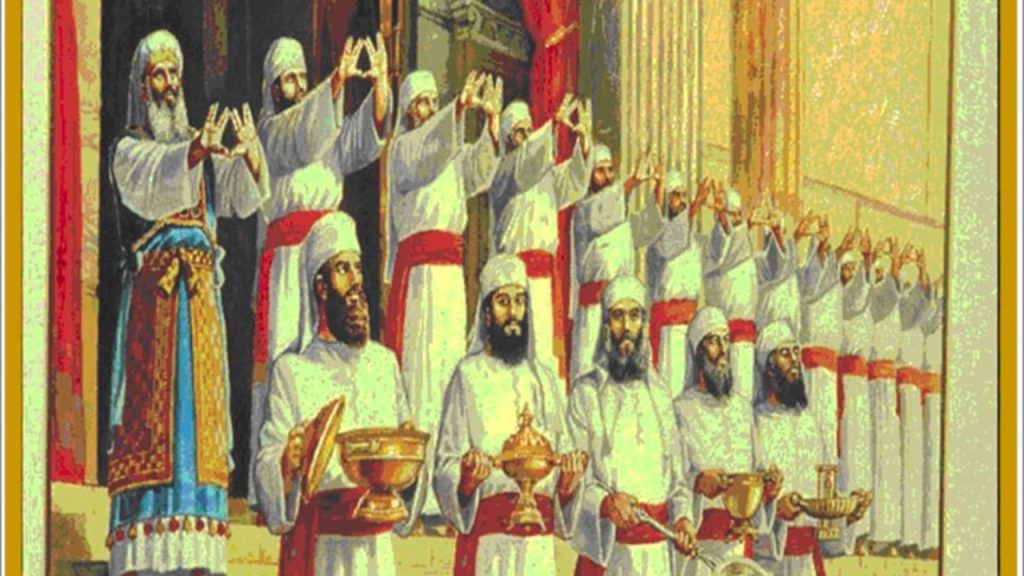
#####
This blog article was inspired by chabbad.org, Sefaria.org

